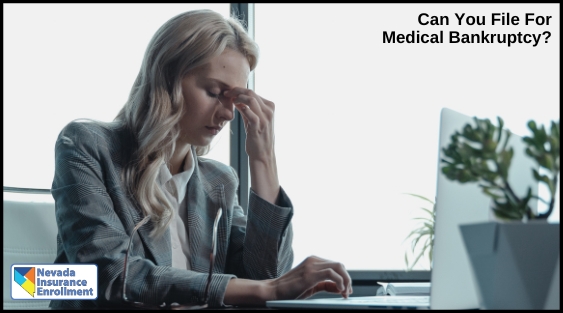When Your Medical Debt Becomes Too Much
What Are Your Options?
When you are facing a medical emergency, the last thing on your mind is the financial implications of hospital stays, medical procedures and treatments. However, once the dust settles and the bills start coming in, you may find yourself facing another kind of crisis.


Can Medical Debt Be Discharged in Bankruptcy?
The short answer is yes; medical debt is considered non-priority unsecured debt and can be discharged in bankruptcy. While you cannot target medical debt in bankruptcy, this process can help lower payments or eliminate the debt altogether.
Understanding Bankruptcy
There are two main types of bankruptcy, including Chapter 7 and Chapter 13. While both types address large debt, the way they work is quite different.
With Chapter 7 bankruptcy, the court considers what you owe and what income and assets you must put toward your debt. With this route, you are likely to have to sell some of your belongings, including property or vehicles, to satisfy your debt. The whole process takes about six months, and in the end, your eligible debts are forgiven. Your credit report reflects the bankruptcy for a decade, making it difficult to get a mortgage, a car loan or a personal loan.
Chapter 13 assesses what you owe, your income, assets and comes up with a repayment plan to make the debt more manageable. In most cases, monthly payments do not exceed 15% of your income. This process can stretch out for years, and certain criteria must be met.


Other Options for Handling Medical Debt
Bankruptcy is an extreme measure that has long-lasting implications on your credit. Fortunately, there are other options for tackling medical debt.
Review Your Bills
Medical bills can be daunting, and if you are like most people, the number you focus on is the total amount you owe. However, auditing your bills and looking for errors such as double charges, fees for services not ordered nor received, can knock hundreds or thousands of dollars off the bill.
Negotiate Costs
In some cases, you may be able to work with your medical provider to get lower costs for services. Some providers have sliding fee schedules for income-qualifying patients, especially those who do not have health insurance.
Investigate Financial Assistance Options
Local agencies such as charities and Community Action Partnerships often have emergency assistance for income-qualifying individuals facing medical debt that they cannot pay.
Talk to Your Medical Provider
Some providers would rather work out an affordable payment plan than send the debt to collections or see it end up in bankruptcy.
Preventing Medical Debt with Nevada Insurance Enrollment
While you cannot always avoid a medical emergency, health insurance can help ensure that your medical bills do not become too much to handle. At Nevada Insurance Enrollment, our health insurance agents help you evaluate your health needs and budget and determine what policies are right for you.
Recent Posts




Hidden Pitfalls of Cheap Auto Insurance
Car accidents can be expensive, and your auto insurance policy is your best protection against financial devastation if the unexpected happens. While state-minimum coverage is definitely better than no coverage at all, a high percentage of scenarios shows it’s not enough for most drivers.




How Financing Your Car Affects the Insurance Premium
However, you may end up paying a higher premium than someone who has not financed their vehicle. If you make payments on your vehicle, your lender requires you to have comprehensive and collision coverage on top of the state minimum requirements.




Adding Uninsured / Underinsured Motorist To Your Policy
Uninsured and underinsured motorist coverage is used when you are hit by a driver that has insufficient coverage or no coverage at all. This optional coverage helps to compensate you for damages, up to your policy limit.
Search This Website
Most Popular Pages
By page visits (this month)
#1) Health Insurance Subsidy Chart
#2) Health Insurance
#3) Health Insurance WITH a Subsidy
#4) Insurance Blog
#5) Request a Quote
Top 5 Most Popular
By page visits (this month)
#1) Health Insurance Subsidy Chart
#2) Health Insurance
#3) Health Insurance WITH a Subsidy
#4) Insurance Blog Posts
#5) Request a Quote
Recent Posts
I Witnessed A Car Accident; What Do I Do?
A car accident can happen in the blink of an eye and witnessing one can be scary. After an auto accident, all drivers involved are required to stay at the scene where information is exchanged for auto insurance purposes. But what should you do if you witness a car wreck?
Accidents / Vandalism: Does Auto Insurance Cover Personal Belongings?
Personal items such as a tablet, wallet, or any personal valuables are not generally covered in your auto insurance policy. Those items would be covered in your homeowners/renters policy. You would have a deductible to pay for first, and then you’d need to consider the consequences of a claim on your homeowners policy.
Windshield / Glass Coverage
Windshield / glass coverage pays the amount of a covered glass loss, and as an added perk, it has a low deductible. Your insurer will cover the full costs of the repairs up to your policy limit, and as long as the costs of the damages don’t exceed your coverage limit, you’ll pay only your small deductible.
Term Life Insurance vs. Whole Life Insurance
Term life insurance policies will often have terms of one year to 30 years. Typically, the monthly premium (monthly payment) stays the same throughout the term of the policy. Whole life insurance provides coverage your whole life and it includes something called “cash value”. Think of it like a mini savings account attached to the policy.